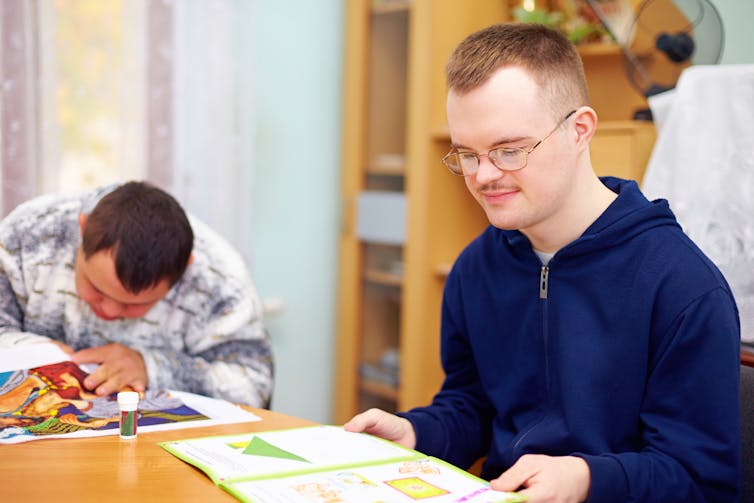- Get link
- X
- Other Apps
Sometimes people with learning disabilities need a hug – but support staff aren't meant to give them

For some people with a learning disability, navigating elements of daily life can be a struggle – and a kind touch or gesture from a support worker can be a real comfort. But it’s not always forthcoming.
As part of my PhD research, I spent months watching how support staff in care settings interact with people with learning disabilities. One day, I was spending time with a young man who was attending employment training to develop workplace skills. At one point, we were sitting down together when he leant his head against my shoulder. I responded by putting my arm around him. A staff member walked past and witnessed this, and after telling the young man that he knew he shouldn’t be doing it, the staff member turned to me and warned me that he might “get the wrong idea”.
I felt awkward and conflicted; on one hand, compelled to offer comfort to someone I could see was lonely and vulnerable. Yet, on the other hand, I was also concerned not to be seen to be flouting “house rules”.
Such rules are the result of a shift in social care policy since the 1970s from a more paternalistic approach, to one focused on enabling people with learning disabilities to become independent members of their communities. The intention, set out by the UK government, has been to enable people with learning disabilities to live “normal” and fulfilling lives. This is partly rooted in the recognition that an unintended consequence of wanting to take care of and protect vulnerable people can be that these people become more dependent and ultimately less able to take care of themselves.
But in recent years, some researchers have begun to question the inherent tension within this approach – particularly when promoting autonomy for people whose condition both qualifies them for support and limits their ability to live independently. For those with learning disabilities, who can be particularly vulnerable and reliant on others, this conflict is stark.
Hand holding forbidden
For my own doctoral research, which was focused on the need to rethink the way social care support is delivered, I spent nine-and-a-half months observing learning disability services in an area in the south-west of England. I immersed myself in the lives of a small group of people in order to see the world through their eyes.The people I spent time with often struggled to achieve independence and community inclusion due to the limits their condition placed on them. Without staff support, they tended to be unable to do many things, such as going to the shops and organising general aspects of their lives.

I also saw that this dependence often played out in an emotional sense: people with learning disabilities would seek comfort and support from staff, often through attempting to hug them or to hold their hand. But, within many of the services where I spent time, relations between staff and people with learning disabilities were governed by rules directing interactions to be “professional”. This often meant that in practice physical contact appeared to be viewed by staff as something to be avoided and discouraged, if not ignored.
During my research, I accompanied some people with learning disabilities and their support workers on a trip to a local shopping centre. I watched as one man with learning disabilities tried to take the hand of one of his support workers, but she very quickly pulled her hand away from him, without verbally acknowledging what had happened.
Importance of emotional engagement
These rules fit with the primary aims of contemporary social care, set out in the 2014 Care Act, which are in place to ensure the promotion of autonomy for people in receipt of support. They are also there to protect both people in receipt of support and the people supporting them from being taken advantage of in what can be vulnerable moments in the delivery and receipt of care. As such, the idea behind these formal rules is to govern what kinds of interactions are acceptable in these settings.Yet, I’m worried that through these policies we might be forfeiting fundamental aspects of human need for touch within relationships – and stopping people from being emotionally fulfilled.
This issue is not unique to learning disability support. Across health and care services emotional engagement is rarely incorporated into processes of care and treatment. In her book, Illness, the philosopher Havi Carel explores coming to terms with a chronic lung condition, in which she describes how her relations with clinicians treating her were defined by “an objective, sanitised language and lack of engagement with social and emotional aspects of illness”.
Read more: child-abuse-begins-with-touch
With increases in medical advancements and life expectancy across developed nations, people are living longer with serious chronic conditions. A consequence of this is that more people require care for longer stages of their lives, including those with learning disabilities. As a society, we urgently need to ensure that such vulnerable people are enabled to live fulfilling lives.
The issue of whether or not support staff should be allowed to hug and touch those under their care also raises questions about the kinds of relationships that are possible in these professional contexts. If we are to think about introducing emotionally-driven support into caring and treatment contexts, we will also need to consider how this may impact upon the staff working in these settings. Many of those professionals who support people with learning disabilities are poorly paid and undervalued. If we are to change what we expect of them when it comes to the emotional engagement they give in their jobs, we must begin to value the staff themselves.
Carys Banks, PhD Candidate, University of Bath
This article was originally published on The Conversation. Read the original article.